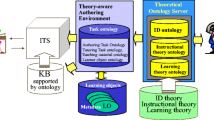Abstract
Foundational ontologies provide the basic concepts upon which any domain-specific ontology is built. This paper presents a new foundational ontology, UFO, and shows how it can be used as a foundation of agent concepts and for evaluating agent-oriented modelling methods. UFO is derived from a synthesis of two other foundational ontologies, GFO/GOL and OntoClean/DOLCE. While their main areas of application are the natural sciences and linguistics/cognitive engineering, respectively, the main purpose of UFO is to provide a foundation for conceptual modelling, including agent-oriented modelling.
Preview
Unable to display preview. Download preview PDF.
Similar content being viewed by others
References
Bunge, M.: Treatise on Basic Philosophy. In: Ontology I. The Furniture of the World, vol. 3. D. Reidel Publishing, New York (1977)
Bunge, M.: Treatise on Basic Philosophy. In: Ontology II. A World of Systems, vol. 4. D. Reidel Publishing, New York (1979)
Chapin, et al.: Business Semantics of Business Rules (BSBR). Initial Submission to OMG BEI RFP br/2003-06-03, January 12 (2004), Available from http://www.omg.org/cgi-bin/doc?bei/04-01-04
Degen, W., Heller, B., Herre, H., Smith, B.: GOL: Towards an axiomatized upper level ontology. In: Smith, B., Guarino, N. (eds.) Proceedings of FOIS 2001, Ogunquit, Maine, USA. ACM Press, New York (2001)
Evermann, J., Wand, Y.: Towards ontologically based semantics for UML constructs. In: Kunii, H.S., Jajodia, S., Sølvberg, A. (eds.) ER 2001. LNCS, vol. 2224, pp. 354–367. Springer, Heidelberg (2001)
Gangemi, A., Guarino, N., Masolo, C., Oltramari, A., Schneider, L.: Sweetening ontologies with DOLCE. In: Gómez-Pérez, A., Benjamins, V.R. (eds.) EKAW 2002. LNCS, vol. 2473, p. 166. Springer, Heidelberg (2002)
Gärdenfors, P.: Conceptual Spaces (2000): the Geometry of Thought. MIT Press, USA (2000)
Green, P.F., Rosemann, M.: Integrated Process Modelling: An Ontological Evaluation. Information Systems 25(2), 73–87 (2000)
Green, P.F., Rosemann, M.: Usefulness of the BWW Ontological Models as a "Core" Theory of Information Systems. In: Proceedings Information Systems Foundations: Building the Theoretical Base, Canberra, pp. 147–164 (2002)
Guizzardi, G., Herre, H., Wagner, G.: On the general ontological foundations of conceptual modeling. In: Spaccapietra, S., March, S.T., Kambayashi, Y. (eds.) ER 2002. LNCS, vol. 2503, p. 65. Springer, Heidelberg (2002a)
Guizzardi, G., Herre, H., Wagner, G.: Towards Ontological Foundations for UML Conceptual Models. In: Meersman, R., Tari, Z., et al. (eds.) ODBASE 2002. LNCS, vol. 2519. Springer, Heidelberg (2002)
Guizzardi, G., Wagner, G., Guarino, N., van Sinderen, M.: An ontologically well-founded profile for UML conceptual models. In: Persson, A., Stirna, J. (eds.) CAiSE 2004. LNCS, vol. 3084, pp. 112–126. Springer, Heidelberg (2004)
Guizzardi, G., Wagner, G., Herre, H.: On the foundations of UML as an ontology representation language. In: Motta, E., Shadbolt, N.R., Stutt, A., Gibbins, N. (eds.) EKAW 2004. LNCS, vol. 3257, pp. 47–62. Springer, Heidelberg (2004)
Guizzardi, G., Wagner, G., van Sinderen, M.: A Formal Theory of Conceptual Modelling Universals. In: Proceedings of the International Workshop on Philosophy and Informatics (WSPI), Germany (2004)
Gupta, A.: The Logic of Common Nouns: an investigation in quantified modal logic. Yale University Press, New Haven (1980)
Hirsch, E.: The Concept of Identity. Oxford University Press, Oxford (1982)
ISO, ISO 1087-1 Terminology work - Vocabulary - Part 1: Theory and application. Copies of all ISO standards can be purchased from ANSI, 25 West 43rd Street, New York, NY 10036 (212) 642-4980 (2000), infoansi.org or http://webstore.ansi.org
van Leeuwen, J.: Individuals and sortal concepts: an essay in logical descriptive metaphysics, PhD Thesis, University of Amsterdam (1991)
Loebe, F.: An Analysis of Roles: Towards Ontology-Based Modelling, Diploma Thesis, Institute for Medical Informatics, Statistics and Epidemiology (IMISE), University of Leipzig (2003)
Opdahl, A.L., Henderson-Sellers, B.: Ontological evaluation of the UML using the Bunge-Wand-Weber Model. Software and Systems Journal 1(1), 43–67 (2002)
OMG, Object Management Group, Meta Object Facility (MOF) 2.0 Core Specification, version 2.0 (2003), http://www.omg.org/docs/ptc/03-10-04.pdf
Searle, J.R.: The Construction of Social Reality. Free Press, New York (1995)
Smith, B., Mulligan, K.: Framework for Formal Ontology. Topoi (3), 73-85 (1983)
Smith, B., Mulligan, K.: A Relational Theory of the Act. Topoi (5/2), 115-130 (1986)
Steimann, F.: On the representation of roles in object-oriented and conceptual modelling. Data & Knowledge Engineering 35(1), 83–106 (2000a)
Steimann, F.: A radical revision of uML’s role concept. In: Evans, A., Kent, S., Selic, B. (eds.) UML 2000. LNCS, vol. 1939, pp. 194–209. Springer, Heidelberg (2000b)
van Belle, J.P.: Moving Towards Generic Enterprise Information Models: From Pacioli to CyC. In: Proceedings of the 10th Australasian Conference on Information Systems, Wellington (1999)
Wand, Y., Weber, R.: An ontological evaluation of systems analysis and design methods. In: Falkenberg, E.D., Lindgreen, P. (eds.) Information System Concepts: An In-depth Analysis. North-Holland, Amsterdam (1989)
Wand, Y., Weber, R.: Mario Bunge’s Ontology as a formal foundation for information systems concepts. In: Weingartner, P., Dorn, G.J.W. (eds.) Studies on Mario Bunge’s Treatise, Rodopi, Atlanta (1990)
Wand, Y., Weber, R.: On the deep structure of information systems. Information Systems Journal 5, 203–223 (1995)
Wand, Y., Storey, V.C., Weber, R.: An ontological analysis of the relationship construct in conceptual modelling. ACM Transactions on Database Systems 24(4), 494–528 (1999)
Welty, C., Guarino, N.: Supporting Ontological Analysis of Taxonomic Relationships. Data and Knowledge Engineering 39(1), 51–74 (2001)
Wiggins, D.: Sameness and Substance Renewed. Cambridge University Press, Cambridge (2001)
Author information
Authors and Affiliations
Editor information
Editors and Affiliations
Rights and permissions
Copyright information
© 2005 Springer-Verlag Berlin Heidelberg
About this paper
Cite this paper
Guizzardi, G., Wagner, G. (2005). Towards Ontological Foundations for Agent Modelling Concepts Using the Unified Fundational Ontology (UFO). In: Bresciani, P., Giorgini, P., Henderson-Sellers, B., Low, G., Winikoff, M. (eds) Agent-Oriented Information Systems II. AOIS 2004. Lecture Notes in Computer Science(), vol 3508. Springer, Berlin, Heidelberg. https://doi.org/10.1007/11426714_8
Download citation
DOI: https://doi.org/10.1007/11426714_8
Publisher Name: Springer, Berlin, Heidelberg
Print ISBN: 978-3-540-25911-4
Online ISBN: 978-3-540-31946-7
eBook Packages: Computer ScienceComputer Science (R0)




